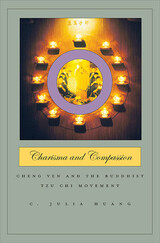
The Venerable Cheng-yen is an unassuming Taiwanese Buddhist nun who leads a worldwide social welfare movement with five million devotees in over thirty countries—with its largest branch in the United States. Tzu-Chi (Compassion Relief) began as a tiny, grassroots women's charitable group; today in Taiwan it runs three state-of-the-art hospitals, a television channel, and a university. Cheng-yen, who has been nominated for the Nobel Peace Prize, is a leader in Buddhist peace activism and has garnered recognition by Business Week as an entrepreneurial star.
Based on extensive fieldwork in Taiwan, Malaysia, Japan, and the United States, this book explores the transformation of Tzu-Chi. C. Julia Huang offers a vivid ethnography that examines the movement’s organization, its relationship with NGOs and humanitarian organizations, and the nature of its Buddhist transnationalism, which is global in scope and local in practice. Tzu-Chi's identity is intimately tied to its leader, and Huang illuminates Cheng-yen's successful blending of charisma and compassion and the personal relationship between leader and devotee that defines the movement.
This important book sheds new light on religion and cultural identity and contributes to our understanding of the nature of charisma and the role of faith-based organizations.

Charisma and Factionalism in the Nazi Party was first published in 1967. Minnesota Archive Editions uses digital technology to make long-unavailable books once again accessible, and are published unaltered from the original University of Minnesota Press editions.
Few aspects of the history of the German Nazi party have had as little scholarly attention as has the nature or pattern of the intraparty factionalism. References to conflicts within the party may be found in most accounts dealing with the Nazi movement, but this book presents the first systematic study of those conflicts and their significance to an understanding of Nazism.
Professor Nyomarkay bases his study on extensive research in which he had access to original source materials, including diaries and memoirs of party leaders and documents from Nazi trials and party archives. His study is concerned with the issues, attitudes, motivations, and actions of the various factions. His conclusions suggest new interpretations of such turning points in the history of Nazism as the Hanover and Bamberg conferences of 1925 and 1926, respectively, the Strasser crisis of 1930, and the stormtrooper purge of 1934.
The author examines the role of Hitler's charisma in the party and shows that this trait elevated Hitler above factional strife, making him the object rather than the subject of rivalries. The discussion of charisma points up the difference between the Nazi factionalism and that which has occurred in other totalitarian movements, such as communism, where authority rests on ideology rather than on charisma.
Through his study Professor Nyomarkay offers a new theory of the relationship between factional conflict and legitimacy of power, presenting a hypothesis of possible typologies of factional behavior based on the nature and degree of group cohesion.
The book is important for students of political science and history and particularly for those interested in totalitarian movements and comparative political parties.
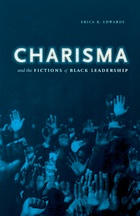
Social and political change is impossible in the absence of gifted male charismatic leadership—this is the fiction that shaped African American culture throughout the twentieth century. If we understand this, Erica R. Edwards tells us, we will better appreciate the dramatic variations within both the modern black freedom struggle and the black literary tradition.
By considering leaders such as Marcus Garvey, Martin Luther King Jr., Malcolm X, and Barack Obama as both historical personages and narrative inventions of contemporary American culture, Edwards brings to the study of black politics the tools of intertextual narrative analysis as well as deconstruction and close reading. Examining a number of literary restagings of black leadership in African American fiction by W. E. B. Du Bois, George Schuyler, Zora Neale Hurston, William Melvin Kelley, Paul Beatty, and Toni Morrison, Edwards demonstrates how African American literature has contested charisma as a structuring fiction of modern black politics.
Though recent scholarship has challenged top-down accounts of historical change, the presumption that history is made by gifted men continues to hold sway in American letters and life. This may be, Edwards shows us, because while charisma is a transformative historical phenomenon, it carries an even stronger seductive narrative power that obscures the people and methods that have created social and political shifts.
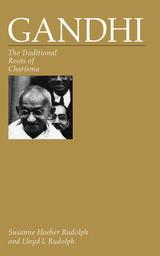
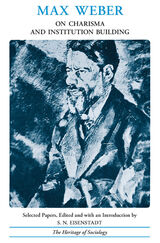
Max Weber on Charisma and Institution Building is a volume in "The Heritage of Sociology," a series edited by Morris Janowitz. Other volumes deal with the writings of George Herbert Mead, William F. Ogburn, Louis Wirth, W. I. Thomas, Robert E. Park, and the Scottish Moralists—Adam Smith, David Hume, Adam Ferguson, and others.
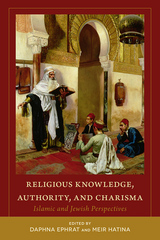
The issue of religious authority has long fascinated and ignited scholars across a range of disciplines: history, anthropology, the sociology of religion, and political science. Religious Knowledge, Authority, and Charisma juxtaposes religious leadership in premodern and modern Islam with examples from the Judaic tradition. By illustrating various iterations of authority in numerous historical and cultural contexts, this volume offers fresh insights into the nature of institutions of learning and other systems of establishing and disseminating authority, the mechanisms for cultivating committed adherents, and the processes by which religious leadership is polarized and fragmented.

READERS
Browse our collection.
PUBLISHERS
See BiblioVault's publisher services.
STUDENT SERVICES
Files for college accessibility offices.
UChicago Accessibility Resources
home | accessibility | search | about | contact us
BiblioVault ® 2001 - 2024
The University of Chicago Press









